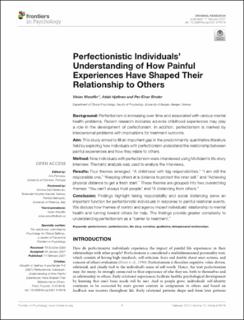| dc.contributor.author | Woodfin, Vivian Irena | |
| dc.contributor.author | Hjeltnes, Aslak | |
| dc.contributor.author | Binder, Per-Einar | |
| dc.date.accessioned | 2022-04-21T11:57:26Z | |
| dc.date.available | 2022-04-21T11:57:26Z | |
| dc.date.created | 2021-10-20T13:19:10Z | |
| dc.date.issued | 2021 | |
| dc.identifier.issn | 1664-1078 | |
| dc.identifier.uri | https://hdl.handle.net/11250/2991997 | |
| dc.description.abstract | Background: Perfectionism is increasing over time and associated with various mental health problems. Recent research indicates adverse childhood experiences may play a role in the development of perfectionism. In addition, perfectionism is marked by interpersonal problems with implications for treatment outcome.
Aim: This study aimed to fill an important gap in the predominantly quantitative literature field by exploring how individuals with perfectionism understand the relationship between painful experiences and how they relate to others.
Method: Nine individuals with perfectionism were interviewed using McAdam's life-story interview. Thematic analysis was used to analyze the interviews.
Results: Four themes emerged: “A childhood with big responsibilities,” “I am still the responsible one,” “Keeping others at a distance to protect the inner self,” and “Achieving physical distance to get a fresh start.” These themes are grouped into two overarching themes: “You can't always trust people” and “A distancing from others.”
Conclusion: Findings highlight taking responsibility and social distancing serve an important function for perfectionistic individuals in response to painful relational events. We discuss how themes of control and agency impact individuals' relationship to mental health and turning toward others for help. The findings provide greater complexity to understanding perfectionism as a “barrier to treatment.” | en_US |
| dc.language.iso | eng | en_US |
| dc.publisher | Frontiers | en_US |
| dc.rights | Navngivelse 4.0 Internasjonal | * |
| dc.rights.uri | http://creativecommons.org/licenses/by/4.0/deed.no | * |
| dc.title | Perfectionistic individuals' understanding of how painful experiences have shaped their relationship to others | en_US |
| dc.type | Journal article | en_US |
| dc.type | Peer reviewed | en_US |
| dc.description.version | publishedVersion | en_US |
| dc.rights.holder | Copyright 2021 The Author(s) | en_US |
| dc.source.articlenumber | 619018 | en_US |
| cristin.ispublished | true | |
| cristin.fulltext | original | |
| cristin.qualitycode | 1 | |
| dc.identifier.doi | 10.3389/fpsyg.2021.619018 | |
| dc.identifier.cristin | 1947283 | |
| dc.source.journal | Frontiers in Psychology | en_US |
| dc.identifier.citation | Frontiers in Psychology. 2021, 12, 619018. | en_US |
| dc.source.volume | 12 | en_US |

